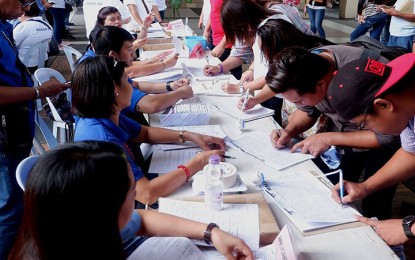
(File photo)
MANILA – The United Nations on Friday said it is ready to support the Philippines address its unemployment rate pegged at 10.4 percent, the highest in 15 years, due to the prevailing coronavirus disease 2019 (Covid-19) pandemic.
The commitment was relayed by UN Resident Coordinator Gustavo Gonzalez during a meeting with Labor Secretary Silvestre Bello III this week.
Gonzalez, together with Khalid Hassan, Director of the International Labour Organization (ILO) Country Office for the Philippines, said that the UN would reinforce its assistance to build a better future of work, strengthen social dialogue, and support the country in implementing the Decent Work Country Programme, starting by backing the upcoming Jobs Summit on May 1.
“The pandemic has accelerated existing trends in remote work, e-commerce, and automation, but also weakened the quality of jobs, coupled with growing rates of unemployment. Open and strong social dialogue among key partners is vital,” Gonzales said.
“Pooling our knowledge and capacities for all-inclusive policies to generate decent work is our priority,” he added, as he welcomed the organization of Jobs Summit.
Bello welcomed the support, saying the government also looks forward to possible areas of cooperation where the UN and ILO could extend assistance in terms of employment facilitation, especially in this time of pandemic.
In preparation for the Jobs Summit, the ILO has worked with the Department of Labor and Employment as well as other stakeholders on studies assessing the impact of Covid-19 on the Philippines’ labor market.
The UN Philippines also supported joint researches on economic diversification focusing on growth opportunities amid disruptions on supply chains and on the current state of Micro, Small, and Medium Enterprises (MSMEs).
The Jobs Summit will bring together national government agencies and relevant stakeholders to tackle economic recovery and jobs generation and is organized by the National Employment Recovery Strategy (NERS) Task Force and the Task Group on Economic Recovery (TGER).
It seeks to identify priority concerns of labor and employer groups; inform stakeholders on actions taken by the Government towards recovery from the pandemic; and provide an avenue for dialogue with government representatives.
“Government, workers, and employers need to work together for human-centered and consensus-based policies not only for economic recovery but also for labor market governance,” Hassan said.
“This should be based on cooperation and compliance with standards and laws. Otherwise, conflicts can affect the productivity of investments and become hurdles in the recovery process as well as in achieving the Sustainable Development Goals,” he added. (PNA)
